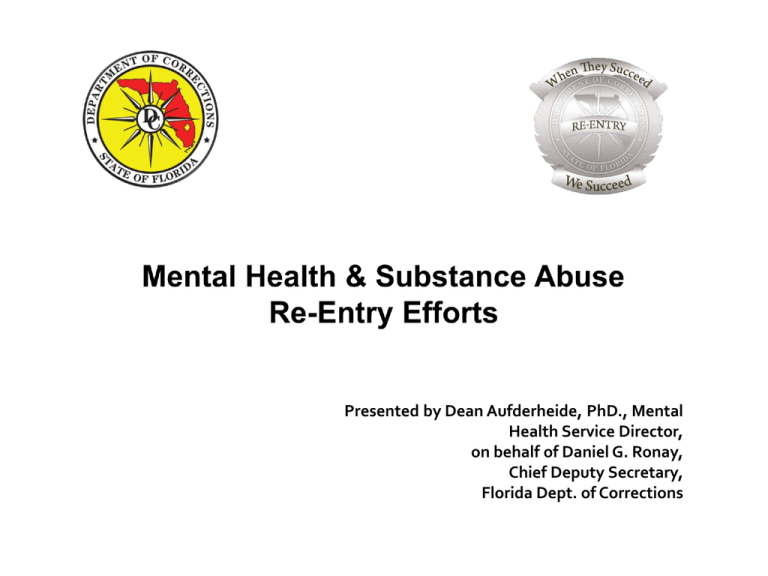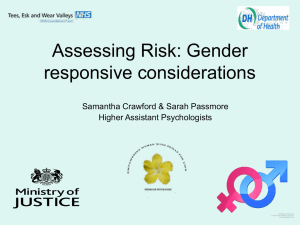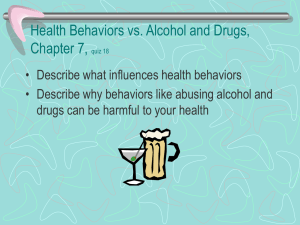
Presented by Dean Aufderheide, PhD., Mental
Health Service Director,
on behalf of Daniel G. Ronay,
Chief Deputy Secretary,
Florida Dept. of Corrections
Just the Facts
United States is about 5% of world population, but
incarcerates 25% of world’s inmates
40% of individuals with serious mental illnesses have
been in jail or prison at some time in their lives
Americans with severe mental illnesses are 3 times
more likely to be in jail or prison than in a
psychiatric hospital
In less than three decades, the percentage of
seriously mentally ill prisoners has almost tripled
from about 6% in 1983 to 15-20% today
Defining the Problem
According to the NAMI report, Florida is 49th in the nation
in per capita spending on mental health services
In Florida, a person with serious mental illness is 5 times
more likely to be in a jail or prison compared to in a
hospital.
There are more inpatient beds in the Florida prison
system than the number of involuntary civil commitment
beds in Florida’s state hospital system
18% of the inmates in the Florida DOC have a diagnosed
mental disorder that requires mental health treatment
2010 Survey of states by the Treatment Advocacy Center and the National Sheriffs’ Association
Florida Mirrors the National Trend in Mentally Ill Population
59% Increase, but Has Stabilized Over Past 3 Years at About18%
20,000
18,000
16,000
14,000
12,000
10,000
8,000
6,000
4,000
2,000
2002
2003
2004
2005
2006
2007
2008
2009
2010
Mental Illness in by Mental Health Grade
Total Inmates 101,767
1%
13%
4%
S1
S2
S3
S4-S6
82%
Florida Department of Corrections - Bureau of Research and Data Analysis - February 14, 2011
Increase in the Percentage of Inmates with Severe and Persistent
Mental Illness (SPMI) within the Mentally Ill Population
(Psychotic Disorders, Bipolar Disorders, Major Depression)
45%
40%
35%
30%
25%
20%
40.%
15%
10%
17%
5%
0%
1995
2010
Florida Department of Corrections, Date Bureau of Research & Data Analysis
Mental Health ReEntry Program
Meeting the Challenge in Florida
Creating an Interagency Agreement between the Department of
Corrections and the Department of Children and Families
Coordinating with the Social Security Administration to complete
SSDI/SSI applications
Establishing Community Partnerships with Stakeholders
Created a Central Office full-time staff position in mental health to provide
oversight and coordinate aftercare services statewide and with
stakeholders
Created new institutional Mental Health ReEntry Specialist positions solely
dedicated to coordinate aftercare services
Number of Offenders Eligible for Post-Release
Aftercare Planning Annually
5,000
4,500
4,000
3,500
3,000
2,500
2,000
4,481
4,287
2007
2008
2009
3,632
1,500
1,000
4,526
2,177
2,367
2,503
2000
2001
2002
2,891
2,740
2003
2004
3,141
500
-
2005
2006
Florida Department of Corrections; Bureau of Research and Data Analysis; November 30, 2010
8
DC/DCF Web-Based Electronic Referral System
DCF Office of Disability
Determination
Potential
Stakeholders
Agency Workforce
Innovation
Florida Institute
Legal Services
DC
Mainframe
DC staff enter referral
information into DC
Mainframe
Encrypted file
transfer
DCF MiniMainframe
Updated Weekly
Agency for Persons
with Disabilities
Veteran’s
Administration
Parole and
Probation
Agency for Health
Care Administration
County Sherriff’s
Department
Office of
Homelessness
DCF Web
Interface
DCF staff receives email notice
of referral and assigns
community provider based on
the county of destination
DC referral information
de-encrypted
DCF staff calls provider
to establish appointment.
DC staff obtains aftercare
arrangements from aftercare
database / communicates
information to inmate.
DC, DCF, CMHC
providers have
access to
aftercare
database.
“Seamless Delivery System”
Residential
Short-term (6 months)
Outpatient
UA Testing
Residential
Long-term Therapeutic
Community
Community
Corrections
Programs
Aftercare
Upon Admission:
IP
Assessment (if
court ordered)
Upon Admission: CC
Post-Release
Substance Abuse
Transitional Housing
In-Prison
Programs
Screening
Upon Release: IP
Prevention
Support Groups
Motivational
Groups
Intensive Outpatient
Substance Abuse
Transition Centers
Residential Therapeutic
Community
Intensive Outpatient: 1,168
• 14 – Correctional Institutions
Residential Therapeutic Communities: 606
• 5 – Correctional Institutions
• 1 –Pre- Release Community-Based
Substance Abuse Transition Centers: 759
Prevention/Outpatient/Aftercare
•
6 – Pre-Release Community-Based
1,048 - Male
120 - Female
561 - Male
45 - Female
503 - Male
256 - Female
In-Prison Substance Abuse
Gaps in Services vs. Need
FY 2009-10
NEED
35,810 inmates were provided
screening assessments at
reception.
~65% of the total inmate
population have consistently
been screened to be in need of
substance abuse treatment
services.
65%
Total = 102,232
As of June 30, 2010 2,533 available department
substance abuse treatment slots.
Approximately 19% of
those have a co-occurring
SA & MH disorder.
84% of released inmates that
needed treatment; did NOT
receive it.
1,061– –73%
Contracted Residential
775 Short – term
Substance Abuse Treatment Beds
286 Long – term – 27%
775 Short – term – 73%
286 Long – term – 27%
37 - Contracts for Outpatient
Substance Abuse Programs and 22
Contracts for Outpatient Mental
Health and Sex Offenders Treatment
available throughout the 20 circuits.
Community Corrections Substance
Abuse: Gap vs Need FY2009-10
Need
Total
•On 6/30/10, 152,928 offenders were on active supervision.
•Approximately 55.8% (85,341) offenders supervised are potentially in need of
substance abuse treatment.
Statistics compiled by the Bureau of Research & Data Analysis
Special Collaborative Re-Entry Project
• At Century Correctional Institution the Department
of Children and Families is funding a Reentry Case
Manager position that provides case management
and follow up services to inmates with substance
abuse problems released from Century CI to the
Escambia County area. Services include:
–
–
–
–
–
Family connectivity
Housing Referrals
Substance Abuse referrals/follow up
Mental Health referrals/follow up
Case management
Seeking New Funding Opportunities
and Partnerships
• Partnering with two community-based treatment providers the
Department submitted a 2nd Chance Grant application for Adult Offenders
with Co-occurring Disorders in June of 2011 .
• The program, if funded, would target inmates with co-occurring substance
abuse and mental health disorders located in the Department’s
Therapeutic Community Program at Jefferson Correctional Institution who
are returning to the Circuit 2 vicinity.
• Post –release re-entry services include mental health and substance abuse
aftercare and case management services, follow-up psychiatric care, and
medication management. Based on individual needs, housing,
transportation and employment skill training will be provided.
.
Circuit 17 Program Targets Severely
and Persistent Mentally Ill
• In 2006, based on legislative appropriation, the
Department partnered with Henderson Mental
Health Center to develop a pilot program that
provides intensive, specialized re-entry rehabilitation
and support services to probationers and released
inmates who have a severe and persistent mental
illness. This program continues today.
• Program Goals include successful re-entry by
preventing unnecessary psychiatric
hospitalization(s), incarceration(s) or crises.
Prison Diversion
• Currently, Circuit 13 has the only pilot prison
diversion program (PDP)
• Offenders are sentenced to the program in lieu of
prison. Program provides varying levels of care.
• Individuals in need of mental health services receive
services through the provider’s psychiatrist or
referred to an outside provider.
• Offenders in need of substance abuse treatment
receive services through the program.
Probation Officers work with Mental
Health Courts
• Circuit 15- Mental Health Court
• Circuit 17-Mental Health Court
• Circuit 12-Sarasota County Mental Health Court
was established in the 1990’s.
• Circuit 13-Pre Trial Intervention Mental Health
Court
• Circuit 20-Lee and Collier counties have Mental
Health Courts
• Circuit 8 –Alachua County Mental Health Court
• Circuit 2 – Mental Health Court
Veterans Dorm Program
• Over 6,700 self-reported Military Service
personnel
• Identified Dorms
– 6 dorms sites
Inmate relocation in process
Curriculum development in process
• Identify programming
– Thinking for a Change, staff trained
– Establishment of community partners
and stakeholders
Veteran Inmates Requiring Post-Release
Mental Health/Substance Abuse Treatment
In 2002/2003, an estimated 1.2 million male veterans were identified as suffering from serious mental illnesses.
Approximately 340,000 of these individuals had co-occurring substance abuse disorders
Inmates referred to DCF/VA for Post-Release
Mental Health/Substance Abuse Treatment in 2007
Level of Service Required for Veterans
6
4%
25
Routine Care
114
Veterans
(115)
96%
(1).
NonVeterans
(3200)
Outpatient w/o
Medications
Outpatient with
Medications
828
Inpatient
The Florida Department of Corrections, Bureau of Research and Data Analysis, Inmate Data Section, January 29, 2008; (1) National
Survey on Drug Use and Health, “Male Users with Co-Occurring Serious Mental Illness and a Substance Use Disorder," Nov.11,
2004, http://www.oas.samhsa.gov/2k4/vetsDualDX/vetsDualDX.htm ;
Recidivism Reduction Initiatives
and Priorities
Increase the number of Pre-Release
Substance Abuse Treatment slots.
Decrease the number of inmates
who are released from prison
without receiving needed treatment.
Target level and length of treatment
based on inmate needs.
Recidivism Reduction Initiatives
and Priorities
Increase mental health training
opportunities for Probation and
Correctional Officers
Increase communication between
Institutional Substance Abuse Treatment
Staff and Mental Health Treatment Staff
Enhance continuum of care by increasing
communication between Institutions and
Community Corrections staff
Recidivism Reduction Initiatives
and Priorities
Develop one (1) additional Pilot
Prison Diversion Program in a rural
circuit.
Partner with Florida Certification
Board, Florida Alcohol Drug Abuse
Association, and Substance Abuse
providers to replicate a certification
process for a Recovery Specialist
Credential.
Recovery Health Network Discount
Prescription Drug Cards
The Importance of Collaborative Leadership to
the Right Thing, the Right Way for the Right Reasons
in Our Mental Health and Substance Abuse Programs
When They Succeed, We Succeed!







